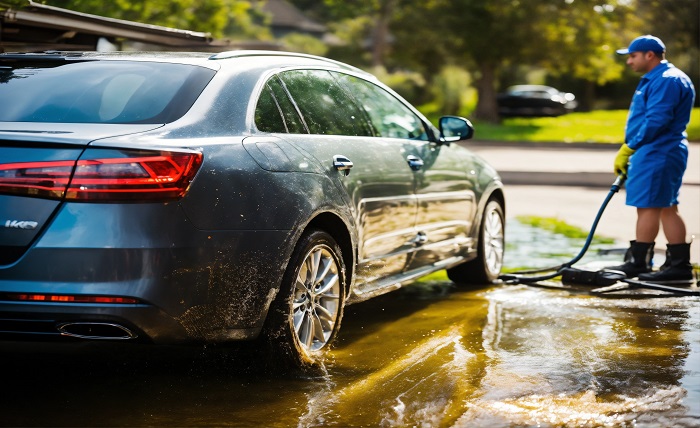Guide to Car Care: Tips for Keeping Your Vehicle in Prime Condition

Introduction:
In today’s fast-paced world, owning a car is more than just a convenience—it’s a necessity. However, many car owners overlook the importance of regular car care, leading to costly repairs and decreased performance. Whether you’re a seasoned car enthusiast or a new driver, mastering the art of car care is essential for maintaining the longevity and performance of your vehicle. In this comprehensive guide, we’ll explore ten essential car care tips to help you keep your prized possession in top-notch condition.
Regular Maintenance Checks
To ensure your car operates smoothly, schedule regular maintenance checks. From oil changes to tire rotations, staying on top of routine maintenance tasks is crucial for optimal performance. Car care experts recommend scheduling maintenance checks every 3,000 to 5,000 miles to keep your vehicle running smoothly.
Keep it Clean
A clean car not only looks great but also helps prevent rust and corrosion. Regularly wash your car, paying close attention to the undercarriage and wheel wells where dirt and debris can accumulate. Additionally, waxing your car every few months adds an extra layer of protection against the elements, keeping your paint looking fresh and vibrant.
Check Fluid Levels
Fluids such as oil, coolant, and brake fluid are vital for your car’s operation. Regularly check fluid levels and top them up as needed to prevent damage to your engine and other vital components. Keeping an eye on fluid levels is a simple yet effective way to maintain your car’s performance and reliability.
Monitor Tire Pressure
Proper tire pressure is essential for safety and fuel efficiency. Invest in a reliable tire pressure gauge and check your tire pressure at least once a month. Underinflated tires can lead to decreased fuel economy and increased tire wear, while overinflated tires can affect handling and traction. Maintaining the correct tire pressure not only improves safety but also extends the life of your tires.
Address Minor Repairs Promptly
Ignoring minor issues such as strange noises or warning lights can lead to more significant problems down the road. Whether it’s a squeaky belt or a check engine light, address minor repairs promptly to prevent further damage and costly repairs. Regularly inspect your car for signs of wear and tear, and don’t hesitate to consult a professional if you notice any issues.
Protect the Interior
The interior of your car deserves as much attention as the exterior. Invest in quality floor mats and seat covers to protect against spills, stains, and wear. Additionally, use a sunshade to protect your dashboard and upholstery from sun damage, prolonging the life of your interior components.
Drive Responsibly
Your driving habits can have a significant impact on your car’s longevity and performance. Avoid aggressive driving, excessive speeding, and sudden stops, as these behaviors can put unnecessary stress on your vehicle’s engine, brakes, and suspension. By driving responsibly, you not only prolong the life of your car but also improve fuel efficiency and safety.
Store Your Car Properly
If you’re not using your car for an extended period, proper storage is essential to prevent damage. Store your car in a garage or carport to protect it from the elements, and consider using a car cover for added protection. Additionally, disconnect the battery and use a fuel stabilizer to prevent fuel deterioration during storage.
Follow the Manufacturer’s Recommendations
Every car is unique, so it’s essential to follow the manufacturer’s recommendations for maintenance and care. Refer to your owner’s manual for guidance on oil change intervals, tire rotations, and other maintenance tasks specific to your vehicle. Following the manufacturer’s recommendations ensures that your car receives the care it needs to perform at its best.
Stay Educated
Car technology is constantly evolving, so staying educated about the latest advancements in car care is crucial. Keep up with automotive news and developments, and don’t hesitate to seek advice from car care professionals or online forums. By staying informed, you can make informed decisions about your car’s maintenance and care, ensuring that it remains in prime condition for years to come.
Conclusion:
Car care is an essential aspect of vehicle ownership, ensuring that your car stays in peak condition for longer. By following the tips outlined in this guide, you can maintain your car’s performance, reliability, and appearance for years to come. Remember to schedule regular maintenance checks, keep your car clean, and address any issues promptly to prevent costly repairs down the road. With proper care and attention, your car will continue to serve you well for miles to come.
FAQs:
1. How often should I wash my car?
– It’s recommended to wash your car every two weeks to remove dirt, grime, and contaminants that can damage your paint.
2. When should I change my oil?
– Oil change intervals vary depending on your car’s make and model, but a general rule of thumb is every 3,000 to 5,000 miles for conventional oil and every 5,000 to 7,500 miles for synthetic oil.
3. Can I perform car maintenance tasks myself?
– While some basic maintenance tasks such as checking fluid levels and changing wiper blades can be done at home, more complex tasks should be left to trained professionals.
4. How often should I rotate my tires?
– Tire rotation intervals vary, but it’s generally recommended to rotate your tires every 6,000 to 8,000 miles to ensure even wear and prolong tire life.
5. What should I do if my check engine light comes on?
– If your check engine light comes on, it’s essential to have your car inspected by a professional to diagnose the issue and prevent further damage to your vehicle.




